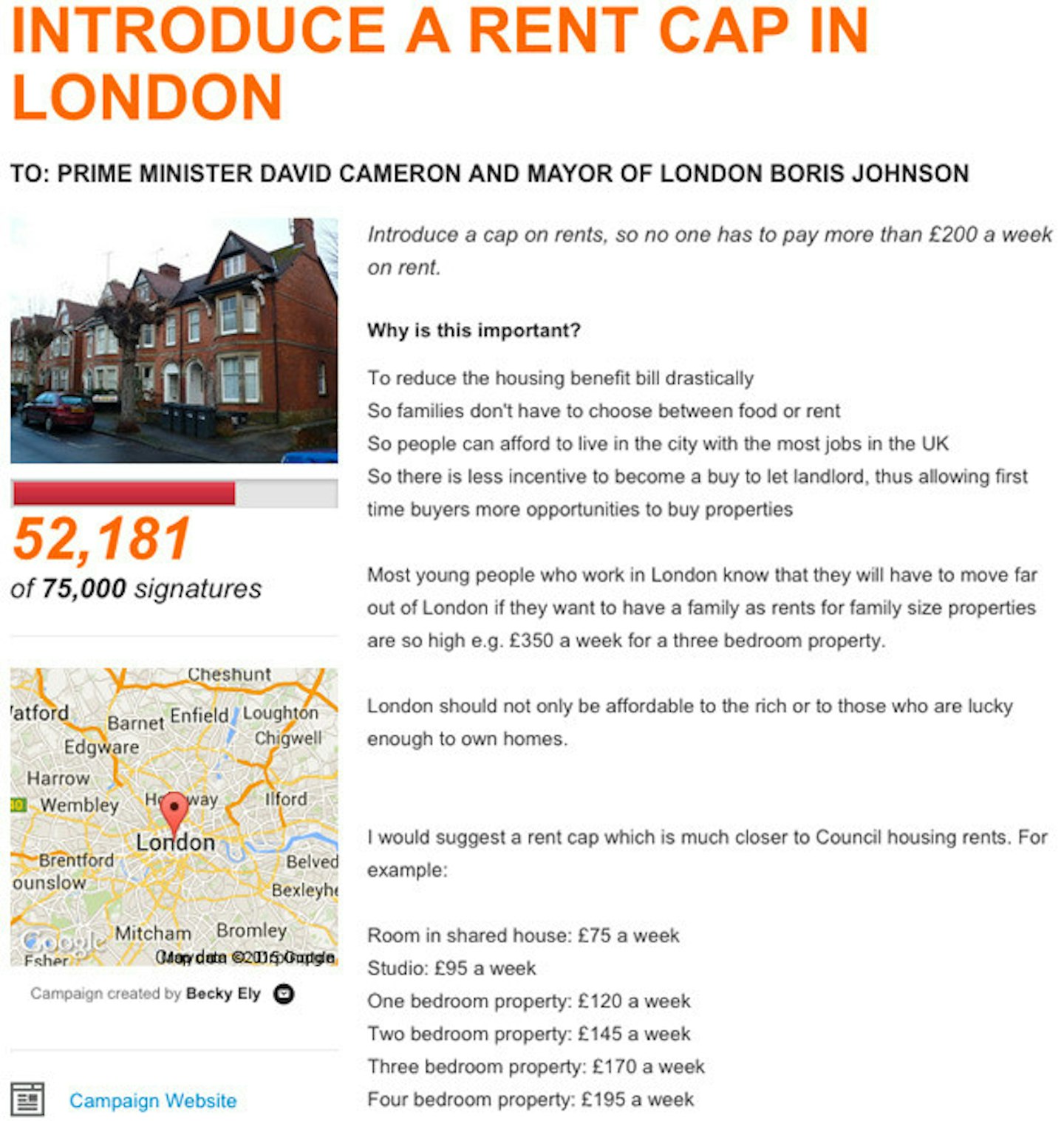Hack your wardrobe, hack your beauty, hack your commute, hack your storage solutions, hack your entire life; we love a shortcut. We love a quick-fix solution that streamlines our existence, cutting through the bullshit to give us enjoyable results, time and space to get on with what we enjoy. That’s generation Y for you. And that’s also Generation Rent.
We literally don’t have the space (some of us are turning living rooms into bedrooms to cut costs) or money (the average Londoner takes home £1,933, the average rent is £1,160, leaving them with £25 a day to spend) to put up with life’s bullshit.
That’s why when a dreamy solution presents itself – this time in the form of an e-petition calling for the government to impose rent caps – we’re up for it. The e-petition, is ostensibly for private renters in London, but as of 6 January, 24,000 people from across the country had signed up to it. At the time of typing, it has 51,000 signatures.
So what is a rent cap? Or rent control? It’s basically when the government decides how much a landlord can charge for a room/flat/house per month, depending on either area, or income of the tenant.
Germany, where 50% of people rent, has rent controls, and New York’s rent controls are why the cast of Friends lived in big Manhattan homes. Rent controls existed in the UK from 1977 to 1980, when they were culled by Margaret Thatcher’s Housing Act. Ever since then, landlords have been able to quote their own prices.
Becky Ely, the 27-year-old Londoner who started the e-petition, says those prices are too high: ‘Currently the amount landlords charge does not reflect value for money, with many charging high rents on substandard property.
‘Many unregulated landlords are treating their tenants poorly. They often ignore their requests to fix repairs in order to maximise short-term profits. A rent cap would ensure that people stop seeing property as an investment and instead see it as a home.’
READ MORE: ‘I Earned Enough Fom Sub-Letting My Rented Room To Jack In My £20k-A-Year-Job’
Her proposed rent caps? £324.75 a month if you’re using a room in a house, £519.60 a month for a one-bed, £627.85 for a two-bed, £736.10 for a three-bed and £844.35 for a four-bed.
The most cursory glance at Gumtree shows that if you want to live in London on £519.60 a month, you’re going to have to either a) live in Essex b) pay more than £519.60 a month or c) share. Plus, young renters are in fear of their landlords putting their rents up year-on-year. Housing charity Shelter says that a third of the properties that the UK’s nine million renters live in are substandard.
Generation Rent might have already come round to the idea that they'll never buy, but they’re now having to deal with the fact it’s getting increasingly harder just to get by.
Bliss Moore, a 23-year-old trainee teacher from Stoke Newington, would love to see Becky’s rent caps implemented. The area she grew up in has undergone a huge wave of gentrification since she was a child. ‘I am from the lucky few whose parents saw it coming, so my mother wisely got on the property ladder at the right time in order to put me and my sisters in good standing. But even with this, it is unlikely that I could afford a house where I grew up.’
She pays £500 a month to live in a shared flat in Finsbury Park where the full rent is £1200 a month. She explains: ‘My old room in my mum’s house is rented for the same amount I pay for my whole flat.’
The idea of a rent cap isn’t a new-fangled, hair-brained one supported by just 51,000 clicktivists; it’s one of the major goals for Generation Rent, an organisation campaigning for private renters’ rights to professionally managed, secure, decent and affordable homes.
A recent Survation/Generation Rent poll found that while 77% of private rentors and 56% of actual landlords support rent caps, only 3.8% of people oppose them.
Alex Hilton, director of Generation Rent, tells The Debrief: ‘Tenants are trapped in rent slavery by ever increasing house prices. And because they’re captured, landlords can charge what they like and this huge profitability drives up house prices, making it a vicious circle.’

He also explains that house prices would then drop, and this is a good thing: ‘Rent controls limit the profitability of landlording, which in turn pushes down house prices. Landlords will still make money, but tenants will not be exploited in the process. It’s about time politicians checked their ideological blinkers and did something useful for a change.’
So what are politicians doing? While Ed Miliband promised last year that a Labour government would bring caps on rent increases, so that your landlord couldn’t increase your rent by more than a certain percentage when renewing your contract, The Department for Communities and Local Government told us: ‘ONS statistics of new and existing rental properties clearly show that rents have fallen in real terms every year since 2010, but we are determined to do all we can to create a bigger, better private rented sector.’
To do this, they say they’ve built new affordable homes and provided literature to help people rent easier and ask for longer tenancies. However, ‘The last thing we want to do is introduce rent controls, which in the past led the private rented sector to shrink dramatically, reducing choice for tenants.’
READ MORE: Housemate Auditions: The Hunger Games Of The Renting World
Henry Pryor, a property expert, also thinks rent caps are a bad idea: ‘It’s a good idea from a tenant’s perspective, but it’s a pretty bad idea if you’re looking at trying to encourage people to get in to the private rented sector to provide accommodation for people. If you impose rent controls it would destabilise the market. There would be a serious withdrawal of rented accommodation.’
The rent crisis looks different around the country. Gentrification might not be driving prices up in, say, Doncaster, and an influx of rich Arab or Russian investors might not be causing landlords to demand £20 more per week for a flat in Birmingham.
However, the one unifying thing causing the housing crisis is a lack of homes: ‘The rental crisis is not the same when you move 100 miles north or west. The market rents are driven by demand, and rents are painfully high across the country,’ Henry says.
George Spencer, CEO of Rentify, an online lettings agent for landlords is also, unsurprisingly, against rent controls. ‘Everywhere rent control has been tried, it has ended in disaster. Look at New York, where you have wealthy heiresses with multi-million-dollar fortunes paying token rents on palatial upper-east-side apartments. Distorting the market creates unfair absurdities. It’s intended to help lower income households, but rich, well-connected tenants who know how to game the system always end up being the winners.
‘No one benefits from rent control in the long term, because it reduces the incentives to invest in current stock. Why would a landlord bother sprucing the place up when he’s prevented from getting a fair market rate for it?’
And of Bliss’s plight? Back to Henry, who puts it bluntly: ‘Tough shit. Housing in this country is not based on allowing people to stay where their parents raised them.’
READ MORE: What Happens When We All Get Priced Out Of London?
That’s why, Henry says, the government’s trying to ‘shift the centre of gravity’ of the country’s attention away from London, with projects like HS2 and nationwide broadband access, ‘to encourage people to communicate and stay in touch with family and friends and work colleagues away from the areas of excessively high rents.’
Becky doesn’t like the idea of people having to move out of cities with extortionate rents. She says: ‘You’d be losing lots of talented young people from the city, and only bankers and very rich people and people already lucky enough to run homes could live in the capital. We need to build at least 250,000 new homes a year – and they need to be affordable. It’s not going to bring rents down overnight and we need politicians to take a stand.’
Landlords are in a position where they don’t have to do much to get a lot of money from rents. Why? Some wouldn’t be able to afford their mortgage re-payments if the suggested rent cap was enforced, especially if mortgage interest rates go up. And, simply, people are willing to pay, due to a lack of choice.
To make housing more affordable, we don’t need lower prices, we need more housing. While that looks like an simple task – just build more homes! – Boris Johnson has consistently missed his housebuilding targets, and there are doubts whether politicians will deliver on the housing promises they’ve made. And all this at a time when budget cuts are just about tearing through the rest of the fabric of our society.
While rent caps might not be a good idea to those in the know, it’s pretty telling that we members of Generation Rent, who would like rent to take up half as much of our waking thoughts and pay packet, are so into them as a concept. Even if Becky’s petition gets nowhere, and Generation Rent miss their goals, these movements are a good measure of how many people are fed up with having to pay extortionate rents.
Things might get worse before they get better, so in the meantime, know your rights, shop around, and vote for and lobby and hold to account the politicians who can sort out this housing mess.
Like this? You might also be interested in:
How The Hell Do You Complain About Your Landlord Without Losing Your Home?
Follow Sophie on Twitter @SophWilkinson
Picture: Lukasz Wierzbowski
This article originally appeared on The Debrief.
